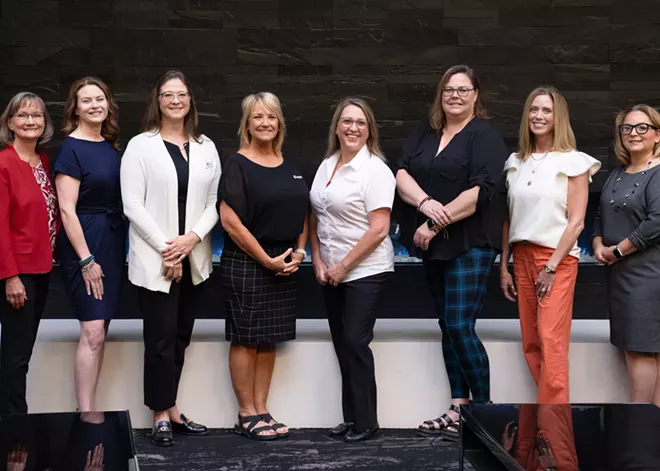Source: site
Courtesy photo
Healthy “coopetition” motivates eight women leading small local credit unions; SCCU’s Deanna Hanley is second from the left.
Credit unions were founded on the principle of collaboration — become a member and, therefore, you own part of the financial institution.
For many, credit unions offer the feeling of ownership over their money and, depending on the size of the institution, a more personal banking experience.
There are 10 credit unions in Spokane that are considered “small” in size (meaning they deal with less than $100 million in assets), and female CEOs run eight of them.
“Spokane has a lot of credit unions,” says Deanna Hanley, CEO of Spokane City Credit Union. “It’s a bit of a different ecosystem than most of the country. So, as a community, we’re all pretty big believers in the credit union movement and the ability to help and collaborate together.”
Hanley is coming up on two years in her position at Spokane City Credit Union (and is the first woman to serve as its CEO), but her predecessors were already thinking about the future of Spokane’s credit union ecosystem far before she entered the role.
For nearly three decades, the CEOs of each local, small credit union have met monthly for breakfast, where they share ideas, offer assistance and discuss goings-on in their world. They call it “coopetition” — a blend of the words “cooperation” and “competition,” a business strategy where competitors work together for mutual benefit.
The credit unions involved include Avista Corp. Credit Union, Canopy Credit Union, Cheney Federal Credit Union, PrimeSource Credit Union, Progressions Credit Union, Responders Emergency Services Credit Union, Safeway Federal Credit Union, Spokane City Credit Union, Spokane Firefighters Credit Union and Spokane Media Federal Credit Union.
Every third Wednesday of the month, the eight female CEOs and their two male counterparts chow down on breakfast and talk finance at the Centennial Hotel. Depending on schedules, sometimes all 10 executives are present — other times, only a handful — but either way, the environment is ripe with knowledgeable tidbits and information.
“It’s a great time to ask questions,” Hanley says. “Like, ‘Have you experienced this? How did you solve it?’ It’s the perfect time to pick each other’s brains about whatever is happening.”
The 10 institutions are small enough to have their finger on the pulse at all times. The CEOs are aware of member issues, finances, staff, community health and other aspects all at once. Hanley says having a group of people who are dealing with the same things is vital to the success of each credit union.
She recalls a situation when someone attempted to defraud one of the credit unions and because those red flags were presented to the group over breakfast, the credit union in question was able to catch it. The leaders also find it valuable that connections to individuals or organizations within the community can be shared around the table.
“I hate reinventing the wheel,” Hanley says. “So if I can find an example of something that I may be experiencing for the first time, but three other women, over their tenure, have run into before, they can tell me how they dealt with it. That’s one of the biggest takeaways from these breakfasts — it just helps save time.”
Whether it’s in a bar bathroom or around a conference room table, women often lift one another up in the face of adversity, but the group’s two male counterparts offer their full support as well.
“We champion them as much as anyone,” says Chris Jentges, CEO of Avista Corp. Credit Union, by email.
Hanley says she’s unsure why Spokane’s credit union ecosystem has spurred so many women to the top spot at their respective financial institutions, but seeing women in leadership positions is always a good thing.
“I think as a society it’s changing and becoming more normal,” she says. “We’re all doing amazing things in small ways, because as a small credit union, you don’t have the same resources that maybe a larger financial institution does, but you’re still out there working for your members.”
The breakfast tradition that started nearly 30 years ago is going strong, and there’s no stopping it anytime soon, as Hanley says there are clear benefits to the “coopetition” model they’ve adopted.
“At the end of the day, you’re operating in the same space,” Hanley says. “You don’t want to see each other as competition; you want to cooperate with each other for the mutual benefit of the community. We want to be competitive for our members by providing products and services that are beneficial to them. But, you also don’t want to do it at the expense of other credit unions.”
As long as there’s a need for credit unions in Spokane and a place to gather and share ideas, these 10 CEOs plan to continue problem-solving over bacon and eggs.
“You would never see two banks work together to solve a problem or to share policies,” she says. “You do see that with credit unions. It’s a part of our DNA, part of what we do for each other. We collaborate, we cooperate and help each other.” ♦





